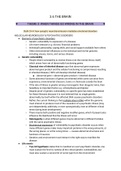3.6 THE BRAIN
♥︎ THEME 3: WHEN THINGS GO WRONG IN THE BRAIN ♥
Stahl CH 4: how synaptic neurotransmission mediates emotional disorders
MOLECULAR NEUROBIOLOGY & PSYCHIATRIC DISORDERS
● Elements of psychiatric disorders
○ Genetic vulnerability to expression of a disease
○ Life event stressors e.g. divorce, financial problems
○ Individual's personality, coping skills, and social support available from others
○ Other environmental influences on the individual and his/her genome,
including viruses, toxins, and various disease
● Genetic vulnerability
○ People inherit vulnerability to mental illness (not the mental illness itself)
which arises from set of abnormally functioning genes
○ Classical view of inherited disease says that abnormal gene expresses
abnormal gene product and the cellular functioning is compromised, resulting
in inherited disease (100% will develop inherited disease)
■ Abnormal gene > abnormal gene product > inherited disease
○ Some abnormal functions of genes are inherited while some can arise from
experience, environmental stressors, toxins or chemicals outside the brain
○ If the rate of illness is greater among monozygotic than dizygotic twins, then
hereditary is important factor e.g. schizophrenia and bipolar
○ Despite proof of genetic vulnerability, no specific gene has been established
for these illnesses because it is now believed that no single genetic
abnormality by itself within the affected DNA causes psychiatric disorders
○ Rather, the current thinking is that multiple sites in DNA within the genome
must interact to produce most of the causation of a psychiatric illness (may
act independently, additively, or even synergistically, even at different critical
times during brain development)
○ There may be both positive and negative modifier genes, which if present also
influence the likelihood that the illness will occur
○ Heterogenity is when different genes may be abnormal in different families
with the same psychiatric illness
○ Biochemical expression of vulnerability to psychiatric disorder occurs when
many different genes make many important proteins in the wrong amounts, at
the wrong places, or at the wrong times → causes abnormal structures and
functions of neurons
○ Genetics and environment must interact in the right way to manifest the
disease
● Life events
○ Two-hit hypothesis states that to manifest an overt psychiatric disorder, one
must sustain the first hit, namely all the critical genetic vulnerabilities, but
must also sustain a second hit of some type from the environment
, ■ Abnormal genetic risk (first hit) + stressors from environment (second
hit) = trigger abnormal genes and their products, causing disease
○ Thus, chance of manifesting psychiatric illness depends on inherited
vulnerability factors AND environmental factors
○ Certain disorders (schizophrenia, bipolar) may have more chance to be
expressed than other disorders (depression, anxiety, OCD), but genetic
vulnerability alone is not enough to express overt psychiatric illness
○ Hypothesis of complex genetics of psychiatric disorders says that 3 risk
factors are inherited and 2 risk factors come from the environment, these
combine and produce a disorder
● Childhood development, personality, coping skills and social support
○ Environmental interactions: early life experiences cause a person to develop
learned patterns of coping (constitute personality), adult life experiences that
encounter from social interaction with the environment (stressful events like
divorce, death of loved one)
○ Personality traits may be genetically influenced (impulsivity, shyness) or
environmentally determined by early childhood developmental experiences →
generate coping skills to deal with impact of events on individual's genome
■ Having social support also helps to buffer stressors
■ Individuals with adaptive personality with good coping skills and
social support may be able to lessen the biological demand on their
genetic code for a disorder
■ Individuals that developed abnormal personality with poor coping
strategies may worsen damaging stressors to play on genome
■ Thus, personality and coping skills are either a filter or a magnifying
glass through which psychosocial stressors pass to challenge the
genome to express potential psychiatric disorders
○ Genome may be robust or vulnerable, and the particular vulnerability explains
why some people develop disorders and others not despite similar life
experiences and similar personalities
○ If have comparable genetic material, personalities and coping skills, it may be
the severity of psychosocial stressors from the environment that determines
how often a vulnerable individual develops a mental illness
■ More biologically determined disorders (with more vulnerable
genomes, like schizophrenia) require only minor or usual stressors for
person to develop mental illness
■ On the other hand, less vulnerable disorders (like depression)
theoretically require moderate or unusual stressors to be expressed
■ However, severe or major stressors (rape, combat) can break down
even normal robust genome to cause mental disorder (PTSD)
, ● Other environmental influences on genomes
○ The environment provides many potential biochemical influences on the
genome like viruses, toxins or diseases
○ These affect probability genetic vulnerabilities for psychiatric illnesses will
manifest
NEURAL PLASTICITY & PSYCHIATRIC DISORDERS
● Neurodevelopmental disorders
○ Normal neurodevelopment: neurons and synapses are properly developed and
maintained to avoid disorders → correct good neurons must be selected in
utero and must migrate to their predesignated locations for the brain to
function properly
○ Developmental disorders: some defective neurons may be chosen and cause
disorder later in life when neuron needs to perform its duties
○ Mechanism that wrong genetic information or toxins (drugs, radiation) cause
abnormal neural selection is by causing “grim reaper” growth factor to be
inappropriately turned on instead of a “bodyguard” growth factor, this causes
wrong cell to turn on its apoptotic suicide system
■ What may be left are puny cells with bad molecular "velcro" (e.g.
cadherins), which cannot crawl along glia/fibers to get where they
need to go
○ Abnormal neural migration is when neurons are not in the correct places and
do not receive appropriate inputs from incoming axons so do not function
properly
■ Could be caused by genes giving wrong directions, which could be
inherited, acquired in utero after mother takes substances or if uterus
sustains radiation





